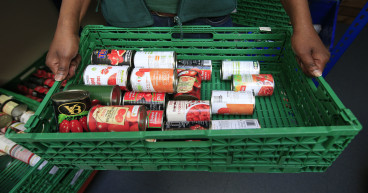AAPL 189.72 1.2218% MSFT 423.08 1.5652% GOOG 173.88 1.1342% GOOGL 172.51 1.2739% AMZN 185.99 -0.5773% NVDA 946.3 3.5838% META 481.54 2.0536% TSLA 173.99 -2.0051% TSM 155.58 2.3889% LLY 787.02 3.1914% V 281.5 1.3538% AVGO 1436.17 4.068% JPM 202.11 0.2978% UNH 517.55 0.7142% NVO 134.66 1.3091% WMT 59.83 -0.0501% LVMUY 171.22 -0.4072% XOM 118.58 0.7733% LVMHF 856.99 -0.1538% MA 458.0 0.8366%
General news
Number of people in very deep poverty rises by almost half since 1997 – charity

Image Source: PAMEDIA
Almost half as many people in Scotland lived in very deep poverty late last decade compared to a quarter of a century ago, new research from the Joseph Rowntree Foundation (JRF) has shown.
The charity found 460,000 people in Scotland were living in very deep poverty between 2017-2020, up from 310,000 between 1994-97 – a rise of more than 48%.
Very deep poverty is described as households below 40% of the median household income.
In research published on Tuesday, the charity said it was the “equivalent of the population of Dundee” falling into very deep poverty over the last 20 years.
Significant numbers of people living in poverty were lifted out in the earlier parts of the 21st century, the report acknowledged.
But following the financial crash in 2007-2008, the number of people in poverty increased.
Of those living in poverty, 46% lived in very deep poverty between 2017-20, up from 27% in 1994-97.
The number of those living in poverty overall has decreased, however.
The divs have caused concern as they predate the pandemic and ongoing cost-of-living crisis and highlight crucial underlying factors which have made the current surge in inflation the crisis that it is, the charity said.
JRF claimed governmental policy has exposed “hundreds of thousands of people” in Scotland to the hardship that many face today.
The charity also said policy decisions made by the Scottish and UK Governments to lower poverty are not being targeted at those who have the least.
The research showed those most in need of support have been allowed to slip even further away from a decent standard of living.
Those most likely to live in very deep poverty include single person households, households including someone who is disabled and minority ethnic households.
JRF has called for a “shift in priorities” and more careful policy design which the charity said is “urgently needed”.
Despite work making up a greater proportion of the incomes of people living in very deep poverty now, compared to 1995-98, income has not risen anywhere near enough, the charity said.
The charity has called on the UK Government to adopt the essential guarantee that JRF are proposing, alongside foodbank charity the Trussell Trust, and said this would ensure Universal Credit provides enough to cover the cost of essentials.
They have also called for the Scottish Government to re-commit and accelerate efforts to create a minimum income guarantee.
JRF’s associate director for Scotland, Chris Birt, said: “The story of poverty in Scotland over the past 20 years is a bleak contradiction that both the UK and Scottish Governments need to wake up to.
“More people just below the poverty line have been pulled above it at the same time as those with the very least (are) falling further behind.
“This rise in very deep poverty can be plainly seen in the hundreds of thousands of food bank parcels provided across the country every year, as well as the growing gap in healthy life expectancy between the most and least deprived areas of Scotland.”
Miles Briggs, the Scottish Conservatives social justice spokesman, said it was “heartbreaking to see that so many Scots have fallen into deep poverty since 1997″.
“These findings make for very grim reading, especially at a time when so many people are struggling with a global cost of living crisis,” the MSP said.
“It is vital that every effort is made to improve the situation of those facing such dire poverty. The SNP must start working together with the UK Government to deliver the help that Scots so urgently need.”
Paul O’Kane, Scottish Labour’s social justice spokesman, said it was a “harrowing reminder of how badly Scotland’s poorest communities have been failed”.
“More and more Scots face destitution but both of our governments are missing in action, squandering the legacy of the last Labour governments,” he said.
A UK Government spokesman said: “We have a plan to halve inflation this year and lay the foundations for long-term growth that will improve living standards for everyone.
“We have also uprated benefits by 10.1%, introduced an unprecedented increase to the national living wage and provided record levels of direct financial support for those most in need.
“We are also giving the Scottish Government an extra £82 million to help people in Scotland with essential costs – this is in addition to the significant welfare powers they already have.”
A Scottish Government spokesman said that it would use the “powers we have to continue to tackle poverty in all its forms and protect people as far as possible from the harm inflicted by UK Government policies”.
“This includes providing free childcare and transport, delivering affordable housing, mitigating the UK Government’s benefit cap and bedroom tax, as well as using Scottish Government benefits to support people, including through the game-changing Scottish Child Payment and the carers allowance supplement, two of seven benefits only available in Scotland.”